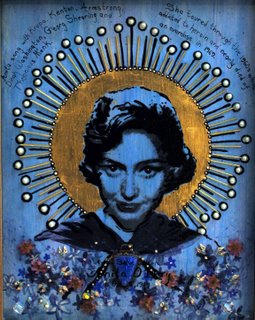
Obituary: Anita O'Day, 87; renowned singer billed as the 'Jezebel of Jazz'
By Dennis McLellan, Times Staff WriterNovember 24, 2006
By Dennis McLellan, Times Staff WriterNovember 24, 2006
Anita O'Day, who shot to fame as a singer with drummer Gene Krupa's swing band in the early 1940s and became one of the most distinctive voices in the history of jazz, died Thursday. She was 87.O'Day died of cardiac arrest in a convalescent hospital in West Los Angeles, according to her manager, Robbie Cavalina.She was recovering from pneumonia and had been in declining health with Alzheimer's disease.
Hip-talking, blunt and feisty, O'Day launched her singing career as a teenager to make extra money while competing on the Depression-era walkathon circuit.She was still a relatively unknown singer in jazz joints in her native Chicago when Krupa hired her as his $40-a-week vocalist in 1941.
Billed as the Jezebel of Jazz a decade later, O'Day titled her 1981 autobiography "High Times Hard Times."In it, she described a troubled life that included back-room abortions, a nervous breakdown, two failed marriages, jail time for drug possession and more than a decade-long addiction to heroin that nearly killed her in an overdose in 1966.
"She was a wild chick, all right, but how she could sing!" Krupa once said.O'Day sang with what jazz critic Leonard Feather described as a "note-breaking, horn-like style and hip, husky sound."As a result of having her uvula (the small, fleshy part of the soft palate that hangs down above the back of the tongue) accidentally cut off by a doctor during a tonsillectomy at age 7, O'Day had no vibrato and was unable to hold notes.
"I'm not a singer; I'm a song stylist," O'Day insisted during a 1989 interview with the New York Times. "I'm not a singer because I have no vibrato…. If I want one I have to shake my head to get it. That's why I sing so many notes — so you won't hear that I haven't got one. It's how I got my style."
In a 1981 Newsweek article on O'Day, writer Charles Michener observed: "The dynamic range of her voice may be smaller than any other jazz singer's except Blossom Dearie's, but her flexibility with it allows her to scat, slide and skitter through a song the way a cat's tongue laps up milk."The same year, O'Day told the Christian Science Monitor: "When you haven't got that much voice, you have to use all the cracks and the crevices and the black and the white keys. That's all the range I've got. I'm no Lily Pons or Sarah Vaughan."
O'Day scored one of the Krupa band's greatest hits with "Let Me Off Uptown," with the great trumpeter Roy Eldridge, in 1941.It featured Eldridge's memorable plea, "Anita, oh Anita! … say, I feel somethin'!" before he launched into an electrifying solo passage.Named New Star of the Year by Down Beat magazine, O'Day went on to amass other hits with the Krupa band, including "Alreet," "Kick It" and "Bolero at the Savoy."
In his book "The Big Bands," big-band chronicler George T. Simon wrote that O'Day's "rhythmic, gutty, illegitimate style first confused but soon converted many listeners. Whereas most girl band singers had projected a very feminine or at least cute girl image, Anita came across strictly as a hip jazz musician."Indeed, O'Day even set a style for female band singers by wearing a band jacket, skirt and shirt instead of a gown while performing on the road."
Few band vocals," Simon wrote, "can compare with her renditions of "Georgia on My Mind," "Green Eyes," "Thanks for the Boogie Ride," "Murder, He Says" and "That's What You Think."Simon described the latter as "a slow, swinging, totally infectious, almost wordless opus in which, as [Krupa] points out, you can hear how much she sounds like a jazz horn."

No comments:
Post a Comment